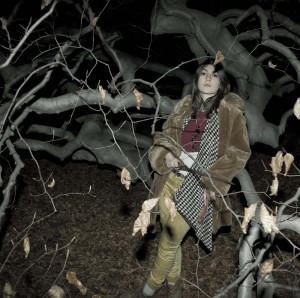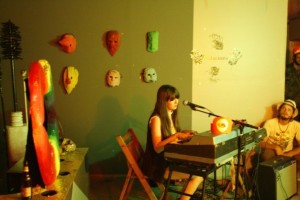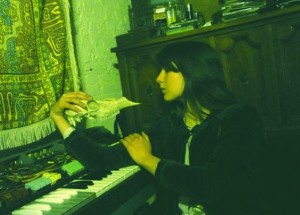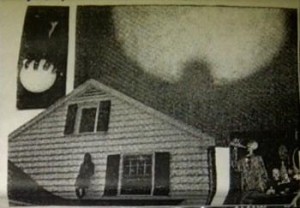Is the name that you chose for your very own creative output a reference to the first novel of Flannery O’ Connor? I’m asking as it seems that some elements of that what is sometimes called “southern gothic“ might be of interest to you.
Yes, it is. I read Wise Blood when I was 16, right around the time I started playing shows. I was so fascinated by the title in a very literal sense, the idea that your biological blood could serve as a looking glass back through time. Alluding to blood as some sort of historical carrier for human potential made me really admire Flannery O’ Connors writings. All bloodlines in the human race eventually, back through time, converge at some point.
When looking at reviews of your work there seem to be some aspects occurring again and again with regard to your voice (like Nico) and the recording technique (lo-fi). Do you feel that journalists are a bit lazy or are you comfortable with such tags? Has Nico been influential to your own creative work?
 The fact I sound like Nico is unintentional. Its really just a sonic phenomenon, we’re both relatively classically trained female vocalists that can sing in a lower register, generally keys that men sing in. We also both sing slightly archaic melodies. I’ve never spent a tremendous amount of time with her records, but I think they’re beautiful. I’ve never tried to emulate her. The one time I can say I really identified with her was very recently, I read an interview she gave in the early eighties where she said her only regret was not being a man. This is an incredibly potent quote, and so telling of the times in which Nico was creating music. I can sympathize with this statement on a lot of levels, I spent a good chunk of my life envying the support systems of males in general, systems that can pin women up against one another, create competition, and ultimately isolate women from one another, and themselves. There’s a real tragic side to Nico’s story. I don’t think in her lifetime she got to see the full maturation of her solo released music (Marble Index, Desert Shore…), as now I think the appreciation of it has surmounted into somewhat of a female-music institution. While she was alive I feel like she was limited by her femme fatale status, remembered for whom she dated, the Velvet Underground, Andy Warhol, and being a supermodel. She wanted to be taken as a real contender, a universe of art in her own right, just as good as any man. It’s incredibly difficult to be making music in a male dominated environment where dismissive attitudes can corner you as being novel, or derogatorily “female”. This attitude depresses me, dismissing the complexity of the music in favor of categorizing all music made by women under a couple bold categories, usually to avoid the complication of exploring females as individuals, but as a mass flock of lovely birds with different plumage. (Ah yes, brown feathers, she’s a Nico…) That is laziness, and also a pretty comprehensive cultural issue that extends far beyond women in music. It’s a stronghold on people’s minds, its not intentionally trying to be dismissive of her or me, but very naturally is so without realizing it. That said, most of the reviews I’ve read have used Nico as a positive compliment, and I have taken it as such. Some reviewers have even expressed their insights that I am not derivative of Nico, which I think is true. As far as lo fi, fidelity is less of a constant than my songs and voice, it’ll change over time.
The fact I sound like Nico is unintentional. Its really just a sonic phenomenon, we’re both relatively classically trained female vocalists that can sing in a lower register, generally keys that men sing in. We also both sing slightly archaic melodies. I’ve never spent a tremendous amount of time with her records, but I think they’re beautiful. I’ve never tried to emulate her. The one time I can say I really identified with her was very recently, I read an interview she gave in the early eighties where she said her only regret was not being a man. This is an incredibly potent quote, and so telling of the times in which Nico was creating music. I can sympathize with this statement on a lot of levels, I spent a good chunk of my life envying the support systems of males in general, systems that can pin women up against one another, create competition, and ultimately isolate women from one another, and themselves. There’s a real tragic side to Nico’s story. I don’t think in her lifetime she got to see the full maturation of her solo released music (Marble Index, Desert Shore…), as now I think the appreciation of it has surmounted into somewhat of a female-music institution. While she was alive I feel like she was limited by her femme fatale status, remembered for whom she dated, the Velvet Underground, Andy Warhol, and being a supermodel. She wanted to be taken as a real contender, a universe of art in her own right, just as good as any man. It’s incredibly difficult to be making music in a male dominated environment where dismissive attitudes can corner you as being novel, or derogatorily “female”. This attitude depresses me, dismissing the complexity of the music in favor of categorizing all music made by women under a couple bold categories, usually to avoid the complication of exploring females as individuals, but as a mass flock of lovely birds with different plumage. (Ah yes, brown feathers, she’s a Nico…) That is laziness, and also a pretty comprehensive cultural issue that extends far beyond women in music. It’s a stronghold on people’s minds, its not intentionally trying to be dismissive of her or me, but very naturally is so without realizing it. That said, most of the reviews I’ve read have used Nico as a positive compliment, and I have taken it as such. Some reviewers have even expressed their insights that I am not derivative of Nico, which I think is true. As far as lo fi, fidelity is less of a constant than my songs and voice, it’ll change over time.
In some descriptions there was a strong focus on the haunting and otherworldly nature of your music, which was then labeled as “ghost-folk” and if you look at “The Outside Room“ there ís a picture of skulls on one label and you’ve performed live accompanied by burning candles. Do you regard Weyes Blood as kind of a voice from a different world, and if yes, how can we imagine this place?
Weyes Blood is of this earth. I occupy my own archetypal sphere of ideas, information, memories and dreams, and this sphere is so tightly woven into my experience of everyday reality that I can’t call it “otherworldly.” I experience the other world enough to make it apart of thee world. My music definitely comes from an invisible place. Skulls are powerful symbols, and those skulls are handmade, crude and caricatured. It all relates to my fascination with spookiness, a very playful assimilation of the fear of death in American culture that has always provided some sense of comfort to me, ever since I was a child. Spookiness in media can walk over to the dark side in jest and playfulness, dealing with very intense archetypes of fear in a completely safe, sugar coated manner. It’s like shallow  waters alluding to the deeper, darker, mysterious forces of reality. It’s in this playful space that intrigue and ideas of the occult can proliferate in a really artful manner; take for example the numerous exceptional electronic music sound tracks to spooky films. It’s an outlet in our culture for unexplainable realities/phenomenon. The candles are just good lighting, emitting mellow frequencies and genuine warmth.
waters alluding to the deeper, darker, mysterious forces of reality. It’s in this playful space that intrigue and ideas of the occult can proliferate in a really artful manner; take for example the numerous exceptional electronic music sound tracks to spooky films. It’s an outlet in our culture for unexplainable realities/phenomenon. The candles are just good lighting, emitting mellow frequencies and genuine warmth.
On the cover of “The Outside Room“ your face seems to blur with the clouds, giving the sleeve a kind of dreamlike quality. One song is called “Dream Song“. What role do dreams and the subconscious play for you and your music?
I am very influenced by my dreams and see them as a gateway to my subconscious. Dreams are inseparable from my waking reality in a lot of ways, Dream Song is actually about experiencing the strange imbalance of desiring to dream more than be awake. The way my dreams fit into my sphere of influences is very natural and difficult to explain. I used to lucid dream and it would start with sounds. I dreamt the best music in the world but I can never fully remember it upon waking. Its my goal overtime to be able to remember the music I hear in my dreams.
Weyes Blood is a solo project, but on your debut there is also a mentioning of the “dark juices” (even though you recorded your album on your own). What do they refer to?
The dark juices refer to me as a bass player, me as a drummer, me as a tape manipulator, everything besides a singer songwriter. In 2006 the Dark Juices were other physical people, two individuals in particular.
I’m interested in your way of proceeding when you write or record songs. Which are the impulses that give you the ideas for your songwriting? What can you tell us about the normal (if there is one) procedure how songs develop?
It all starts with an emotion. The melody usually develops from this initial experience, melody is such an emotional experience for me, but in rare cases the words develop first. I write the melody and it’s alive and evolving rapidly, and then it solidifies, and the words start to erupt. I usually have many versions of songs and how each verse/ chorus is chosen really depends on trial and error, and letting things simmer over time. Sometimes I get struck by lightning and it all comes out at once fully formed.
I’m wondering if the “you“ that’s addressed in some of the songs on your debut refers always to the same person.
Wouldn’t “you” like to know?
Compared to “The Outside Room“ “Strange Chalices Of Seeing“ seems to be more experimental in nature and maybe less focused on the song. What is the relationship between these releases and would you say that with “The Outside Room“ you’ve found your “voice“?
 I’ve always sang and wrote songs. Strange Chalices of Seeing was a Frankenstein tape piece, with songs and lyrics buried in tape ether, primarily improvisational and stitched together, referring to multiple “chalices” of hallucinatory nature. It was made in a week, I had a dead line because I was touring. I have always been split down the middle by sonic explorations and song explorations, the two can rob each other of the spotlight in their polarity, the sonic influences dominated Strange Chalices of Seeing because of the time frame in which it was made, and my fascination with underground tape/noise culture at the time. But Weyes Blood used to be Wise Blood in ‘06, and I would just play nylon string guitar acoustically and sing ballads. It’s always been more like The Outside Room. I wouldn’t say I’ve found my voice on the Outside Room, if anything I’ve found a different version of Strange Chalices of Seeing—a more planned attempt at bridging these two universes. The Outside Room took almost two years to complete, it’s a nice heap of porridge but not quite the porridge Goldie locks would choose.
I’ve always sang and wrote songs. Strange Chalices of Seeing was a Frankenstein tape piece, with songs and lyrics buried in tape ether, primarily improvisational and stitched together, referring to multiple “chalices” of hallucinatory nature. It was made in a week, I had a dead line because I was touring. I have always been split down the middle by sonic explorations and song explorations, the two can rob each other of the spotlight in their polarity, the sonic influences dominated Strange Chalices of Seeing because of the time frame in which it was made, and my fascination with underground tape/noise culture at the time. But Weyes Blood used to be Wise Blood in ‘06, and I would just play nylon string guitar acoustically and sing ballads. It’s always been more like The Outside Room. I wouldn’t say I’ve found my voice on the Outside Room, if anything I’ve found a different version of Strange Chalices of Seeing—a more planned attempt at bridging these two universes. The Outside Room took almost two years to complete, it’s a nice heap of porridge but not quite the porridge Goldie locks would choose.
What role do limited (cassette) releases play? Are they spaces where you can experiment?
I am torn about tape releases. Everything I record to release takes a lot of time, energy and focus, but considering my fascinations with wide ranges of fidelity and sonic possibilities, tapes do afford me the opportunity to pursue more fringe-ideas that might only be palatable to those that collect underground tapes.
Is the slight change of the spelling of your band name (from „Bluhd“ to „Blood“) an indication of the slight change in musical direction?
Definitely, it could change again.
You’ve shared the stage and some recordings with a couple of artists (e.g. Axolotl, Angels in America). Would you say that despite some differences in musical direction you all share a certain attitude towards music, experiment and life?
 Sure, you can say that about any underground musician, it’s a very specific path with few rewards, it’s a path for people with vivid imaginations and potent ideas, it’s a path for people that question mainstream society and live according to their own cosmologies.
Sure, you can say that about any underground musician, it’s a very specific path with few rewards, it’s a path for people with vivid imaginations and potent ideas, it’s a path for people that question mainstream society and live according to their own cosmologies.
With Jacky-O Motherfucker you took part in a rather improvisatory collective with a very spontaneous approach to musical structures. Do you also improvise when you record music for Weyes Blood? Where do you see the main differences in both projects?
I was only in Jackie-O for month or so, it’s really just a drop in the bucket. I was an improvisational musician at the time so it totally fit, Strange Chalices of Seeing was very improvisatory, but over the years I’ve evolved back to my initial state of having an established structure for the improvisatory meanderings to weave into. I let things go off the handle and leave things to chance, like tape sounds and harmonies, but the bones are all planned. Improvisation might be so ingrained into my way of approaching music that I don’t even notice it anymore. I’m a jammer.
Your debut has been released on Not Not Fun. Was it clear from the very beginning that you would release on that label?
It wasn’t clear. When they asked me in 2008 I said yes, but once I started accumulating my own money I thought I’d put it out myself, hoping not to be associated with absolutely anything, charge people from left field. This idea dwindled as my savings eventually were spent because the record took me longer than I expected to complete, and NNF was kind enough to keep their offer.
As I’m sending you these questions one day after Halloween, would you say that this time of the year is of particular interest for you (if one neglects the rather extreme commercial aspects)?
And now it’s after Thanksgiving! But yes, Halloween is most definitely my favorite holiday. I love any celebration during the fall, the smells and the atmosphere are so shadowy and crisp. Lots of smokey smells, leaves burning. I also have expressed myself through the years with elaborate costumes, and enjoy the creative license people take when they can be something or somebody else. I think a lot of people look better in costume. I also love having an excuse to exercise spookiness in the context where everybody else is, one of the only holidays where death is acknowledged and playfully incorporated into festivities.
Finally, is there anything you would have liked to have been asked (or not asked)?
I love talking about gender politics, and other issues of modernity and its affects on our minds and culture. There are a lot of ties between our culture and other ancient cultures, and I wish more people, disturbed by the overwhelming factors of globalization, would look back into these times for answers. There’s nothing new under the sun.
(M.G. & U. S.)
